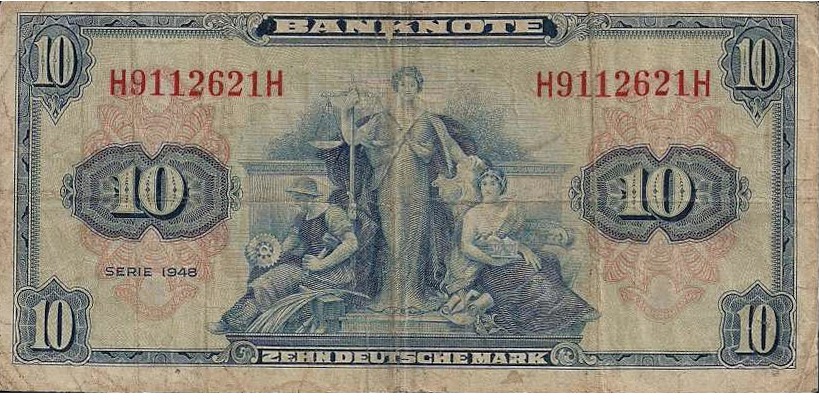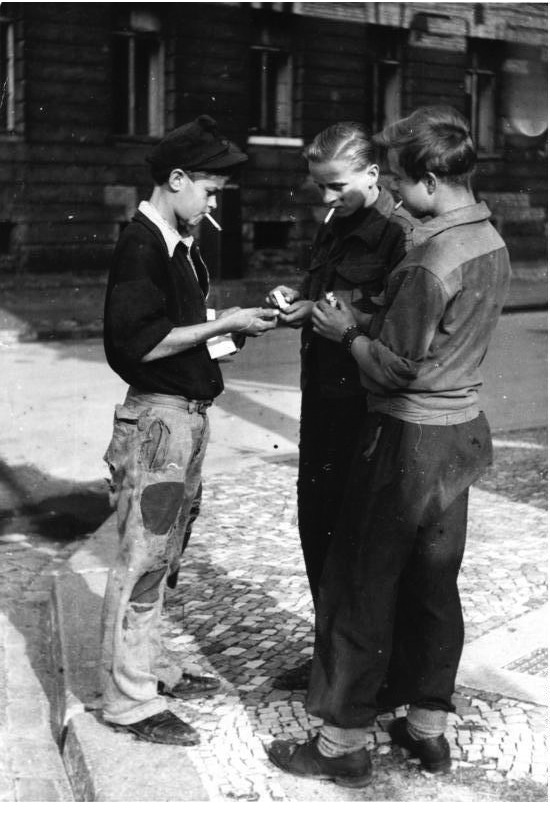LUDWIG ERHARD AND THE GERMAN CURRENCY REFORM

The beginnings of this radical reorientation of French policy with regard to Germany, which Milward dates to the London conference and the middle of 1948, coincides more or less with the currency reform - Reichmark replaced by the Deutschmark - which occurred on 20th June 1948 and is generally seen as the beginning of the German 'economic miracle' - the end of the post-war period of deprivation and beginning of the restoration of West Germany as a major economic power (it could be called the third German 'economic miracle' after the miracles that occurred in 1924 - end of inflation - and 1933 - beginnings of a solution to the problem of unemployment).
It was universally agreed that the Reichmark was no longer serviceable as currency. No-one wanted to hold Reichmarks for any length of time which inhibited any long term investment. Where production occurred, the lack of trust in the Reichmark encouraged hoarding in the expectation that things would improve. For many people the sole access to necessary goods was through the black market where small scale transactions were conducted on a basis of barter, with cigarettes often used as a form of currency. The reform was delayed through disagreements with the Soviet zone as to how the new currency could be supplied. The decision to go ahead with introducing the Deutschmark into the Western zones (the US/UK bizone and the French zone) marked the definitive end of the possibility of a united Germany. It was immediately followed by the introduction of a new currency in the Soviet zone and the blockade of Berlin, the point at issue being the Soviet desire to introduce their currency through the whole city and the Western desire - supported by the elected German administration - to introduce their currency into the areas under their control. Bullock's biography of Ernest Bevin has much to say about the Berlin blockade but little on the effects of the currency reform in West Germany. The name 'Ludwig Erhard' does not appear in the index. I shall pursue the opposite approach.

Cigarettes as currency
The currency reform and attendant 'economic miracle' have an importance that goes beyond the actual historical event. To quote the German-American historian Diethelm Prowe: 'For many years, the immediate postwar phase of German history was wholly overshadowed by the so-called economic miracle, which, as the allegedly purest model of American-style free enterprise in all of Europe, raised Germany from the depths of economic destruction and despair within a few years and initiated an extraordinarily long period of sustained economic growth.' (6) When in the 1970s Keith Joseph established what was to become the Centre for Policy Studies, one of the motors dismantling Conservative Party acceptance of the postwar British Keynesian consensus, he initially called it the 'Ludwig Erhard Foundation' and 'Institute for a social market economy' - 'social market' being the term used to describe Erhard's economic philosophy. Reading about how the reform was implemented suggests that it might have been the inspiration behind the disastrous 'shock therapy' imposed on the former Soviet Union in the 1990s.
(6) Diethelm Prowe: 'Economic Democracy in Post-World War II Germany: Corporatist Crisis Response, 1945-1948', The Journal of Modern History, Sept 1985, Vol 57, No.3, pp.151-182 (this extract pp.151-2). Born in Bonn in 1941, Prowe's academic career was pursued as a Professor in Carleton College, Minnesota, from 1966 until his retirement in 2008. He was editor of the German Studies Review.
Although the actual currency change was an American project the implementation was planned and executed by a German administration. When the bizone - officially coming into existence in 1st January 1947 - was formed five central offices were established staffed by German civil servants covering economy, transport, finances, postal services and food supply. Subject to approval of the occupying powers they had the right to issue law in their own areas of competence. It was as Director of the Economics Administration that Erhard became responsible for managing the currency reform. (7)
(7) This account is based on the first chapter of Mark E.Spicka: Selling the Economic Miracle - Economic reconstruction and politics in West Germany, 1949-1957, New York and Oxford, Berghahn Books, 2007 (the full text is available free of charge at https://www.berghahnbooks.com/title/SpickaSelling). Spicka is a historian based at Shippensburg University in Pennsylvania.
Between 1928 and 1942 Erhard had worked in market research in the Nuremberg Commercial College under Wilhelm Vershofen who, in 1935, founded the powerful Berlin-based Gesellschaft für Konsumforschung (Society for Consumer Research). He left Vershofen in 1942. According to Mark Spicka (pp.33-4): 'Erhard, an ardent supporters of the free market, disagreed sharply with Vershofen's support of cartels to order the economy. During the late 1930s and early 1940s, Erhard had become familiar with the leading economists of the neoliberal school, including [Walter] Eucken, [Alexander] Rüstow and [Wilhelm] Röpke. Having parted with Vershofen, Erhard had founded his own Institut für Industrieforschung (Institute for Industrial Research) with funding from several major industrial firms. During 1942/43 Erhard concentrated upon studying Germany's transition to a peacetime economy after the war.'
Spicka suggests that 'the circulation of his 268 page memorandum Kriegsfinanzierung und Schuldenkonsolidierung (War finance and debt consolidation) was a potentially dangerous move on Erhard's part for [after?] Josef Goebbels' declaration of "total war" in January 1942, talk of the peace after the war's conclusion was unacceptable to the Nazi regime.' However, his own footnote goes on to quote a biography of Erhard by Volker Hentschel saying that 'the economics ministry, in conjunction with heavy industry, was already interested in generating plans for the conversion of the wartime economy to a peacetime economy.' It would surely be surprising if it were otherwise. The German historian Werner Abelshauser, who has done much to overturn conventional notions of German economic history, says that 'the principles of the market economy were entirely perceptible in the plans for the post-war order envisaged by the National Socialist economic associations and authorities in the final phase of the total war and ... they offered an astonishingly large field of action to convinced supporters of the market economy, such as Ludwig Erhard.' (8)
(8) Werner Abelshauser: 'Aux origines de l'économie sociale de marché - État, économie et conjoncture dans l'allemagne du 20e siècle,' Vingtième Siècle, revue d'histoire, April-June, 1992, No 34, pp.173-191. This extract p.187. My translation of what I assume is a French translation of a German original.